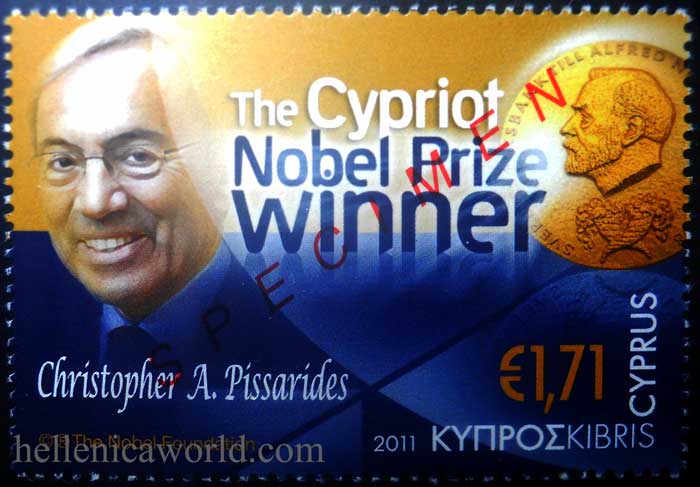.
Christopher Antoniou Pissarides F.B.A. (Greek: Χριστόφορος Αντωνίου Πισσαρίδης; born 20 February 1948[1]) is a Cypriot economist. He currently holds the Norman Sosnow Chair in Economics at the London School of Economics. His research interests focus on several topics of macroeconomics, notably labor, economic growth, and economic policy. In 2010, he was awarded the Nobel Prize in economics, jointly with Peter A. Diamond and Dale Mortensen, for his contributions to the theory of search frictions and macroeconomics.[3]

Christopher A. Pissarides, 2011 Stamp
Biography
Pissarides was born in Cyprus[4] (into a Greek-Cypriot family) in the village of Agros. He received his B.A. in Economics in 1970 and his M.A. in Economics in 1971 at the University of Essex.[2] He subsequently enrolled in the London School of Economics, where he received his PhD in Economics in 1973 under the supervision of the mathematical economist Michio Morishima.[2]
He currently holds the Norman Sosnow Chair in Economics at the Economics Department and is Director of the Research Programme on Macroeconomics at the Centre for Economic Performance, both at the London School of Economics (where he has been since 1976).[5]
Academic contributions
Pissarides is mostly known for his contributions to the search and matching theory for studying the interactions between the labor market and the macro economy. He helped develop the concept of the matching function (explaining the flows from unemployment to employment at a given moment of time), and pioneered the empirical work on its estimation.
More recently Pissarides has done research on structural change and growth.
Pissarides' most influential paper is arguably "Job Creation and Job Destruction in the Theory of Unemployment" (with Dale Mortensen)", published in the Review of Economic Studies in 1994.[6] This paper built on the previous individual contributions that both authors had been making in the previous two decades.
The Mortensen-Pissarides model that resulted from this paper has been exceptionally influential in modern macroeconomics. In one or another of its extensions or variations, today it is part of the core of most graduate economics curricula throughout the world.
Pissarides' book Equilibrium Unemployment Theory, a standard reference in the literature of the macroeconomics of unemployment, is now in the second edition, and was revised after Pissarides's joint work with Mortensen, resulting in the analysis of both endogenous job creation and destruction.
Awards and honors
Fellow of the Econometric Society, 1997[2]
Fellow of the British Academy, 2002[2]
Fellow of the European Economic Association, 2005
IZA Prize in Labor Economics, jointly with Dale Mortensen, 2005[7]
Foreign Honorary Member of the American Economic Association, 2011
Vice President of the European Economic Association - President in 2011
Nobel Prize in Economics in 2010, jointly with Dale Mortensen, Peter A. Diamond,[8] for "analysis of markets with search frictions"[8][9]
Selected works
1979. "Job Matchings with State Employment Agencies and Random Search", Economic Journal 89(356), pp. 818–33.
"Short-Run Equilibrium Dynamics of Unemployment Vacancies, and Real Wages," American Economic Review, (1985) 75(4), pp. 676–90.
1986. "Unemployment and Vacancies in Britain." Economic Policy, 1(3), p p. 499–559.
1994. "Job Creation and Job Destruction in the Theory of Unemployment" (with Dale Mortensen), Review of Economic Studies 61(3), pp. 397–415.
2000. Equilibrium Unemployment Theory, second edition, Cambridge, MA: MIT Press. Description and chapter-preview links.
"Structural Change in a Multi-Sector Model of Growth" (with L. Rachel Ngai), American Economic Review, forthcoming.
References
^ a b Prof Christopher Pissarides at debretts.com
^ a b c d e "LSE - Christopher A. Pissarides - CV" (PDF). Retrieved 2010-10-11.
^ The Sveriges Riksbank Prize in Economic Sciences in Memory of Alfred Nobel 2010 Peter A. Diamond, Dale T. Mortensen, Christopher A. Pissarides, official web site
^ "Christopher A. Pissarides - Biographical". Nobelprize.org. Retrieved 2010-10-11.
^ "News". Salome.lse.ac.uk. 2007-06-14. Retrieved 2010-10-11.
^ Dale T. Mortensen and Christopher A. Pissarides, 1994. "Job Creation and Job Destruction in the Theory of Unemployment," Review of Economic Studies, 61(3), pp. 397–415 (press +).
^ IZA (2010-08-12). "Prize". IZA. Retrieved 2010-10-11.
^ a b "The Prize in Economic Sciences 2010". Nobelprize.org. Retrieved 2010-10-11.
^ "3 Share Nobel Economics Prize for Market Analysis". New York Times. 2010-10-12. Retrieved 2010-10-12.
| Ancient Greece
Science, Technology , Medicine , Warfare, , Biographies , Life , Cities/Places/Maps , Arts , Literature , Philosophy ,Olympics, Mythology , History , Images Medieval Greece / Byzantine Empire Science, Technology, Arts, , Warfare , Literature, Biographies, Icons, History Modern Greece Cities, Islands, Regions, Fauna/Flora ,Biographies , History , Warfare, Science/Technology, Literature, Music , Arts , Film/Actors , Sport , Fashion --- |
Retrieved from "http://en.wikipedia.org"
All text is available under the terms of the GNU Free Documentation License

